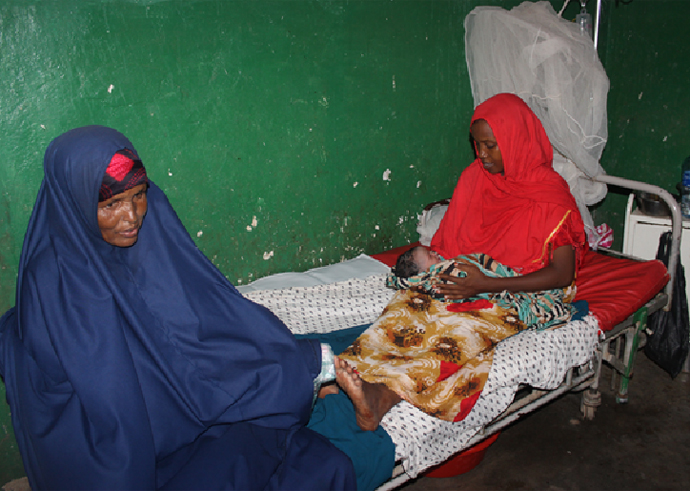Maternal Health Poses Major Challenge for IDPs in Mogadishu

Somalia is among the countries with the highest maternal mortality rates in the world making the nation be one of the worse places for mothers to deliver their babies.
The health crisis for mothers and infants in remote areas and IDP camps has led the horn of African nation lost many women and infants.
In camps for internally displaced people in Mogadishu, mothers give birth in huts made of sticks and old rugs, for those who are lucky they are taken to the clinic in the camp where there might be no or fewer facilities.
When Amina Sayid Omar, nine months pregnant with her fifth child, began to bleed, she knew that something was wrong. But it wasn’t easy to get help. First, her relatives took her to the nearest clinic, but the doctor, lacking the facilities to deal with her, turned her away.
When an ambulance arrived after an hour and a half to take her to Benadir hospital, her baby was dead and her life was in danger.
By the time the 25-year-old arrived at Benadir Hospital, she couldn’t walk, was badly dehydrated, and had lost three pints of blood. She had suffered a massive uterine rupture, a tearing of the womb, and was rapidly bleeding to death.
She was in danger of becoming another statistic in the camp where statistics really matter. The risk of dying in childbirth in IDP camps in Mogadishu is higher than anywhere else in the world.
Luckily for Ms. Omar, she reached help just in time. She was unable to speak, her tongue swollen by a tumour. She made no sound as the nurse explained how this pregnancy, coming so soon after the last one, weakened her uterus wall to the point of bursting.
She survived only because her relatives accompanied her to the hospital, and donated the blood she needed to save her life.
Omar says the odds are stacked against the pregnant women due lack of health facilities in the camps and makes maternal mortality rate in the camps high.
“If you are pregnant in IDP camps, you are sitting with one foot in the grave; so the question is whether you fall in or are able to come out,” said Omar.
Sahro Abukar Mohamed, a mother of three said in the camps there are no well-equipped health facilities and that made many people face lack of medical services.
Mohamed accused the NGOs operating in the camps of bypassing the reality and priorities of the IDPs.
“A lot of people who are IDPs today, you can imagine how they are malnourished while they are in pregnancy,” Mohamed said. “And the premature delivery is frequent here,”
Experts say Somalia has been left behind because it has not had a functioning government for near two decades.